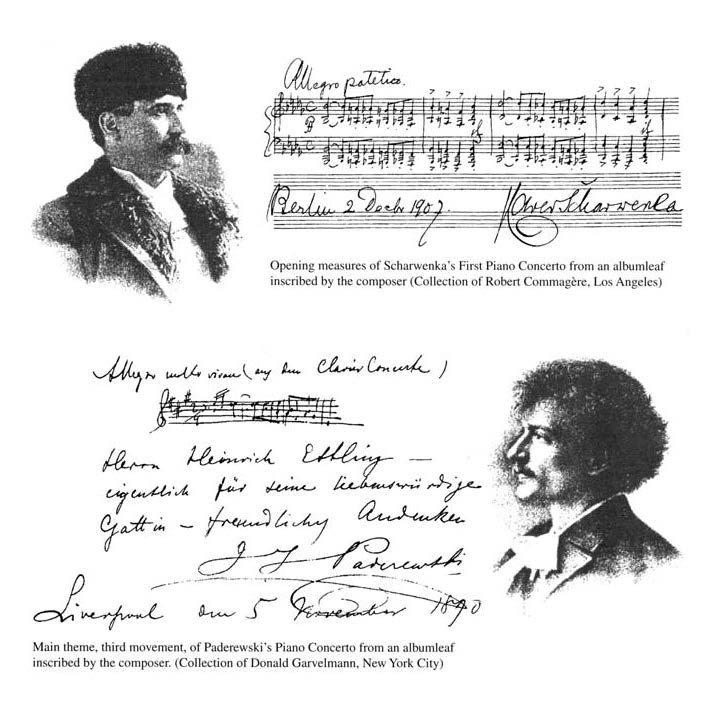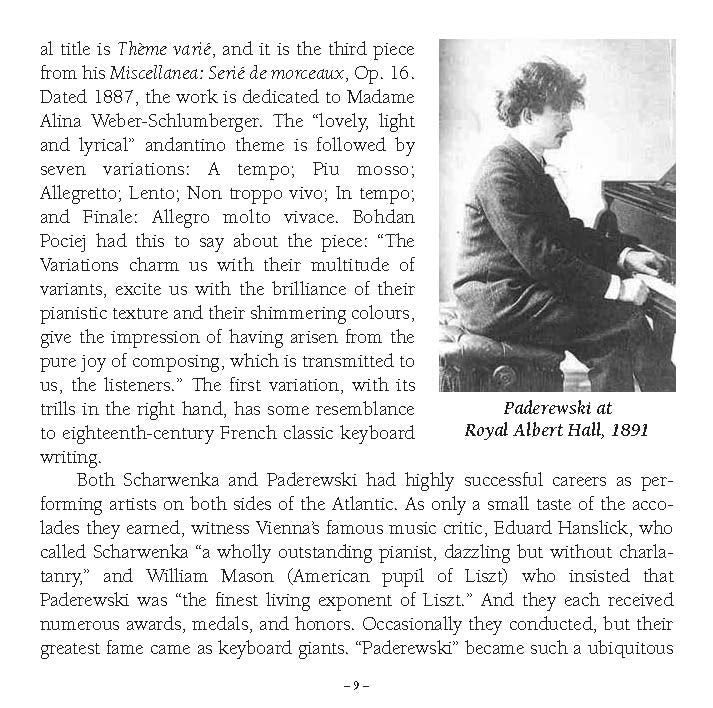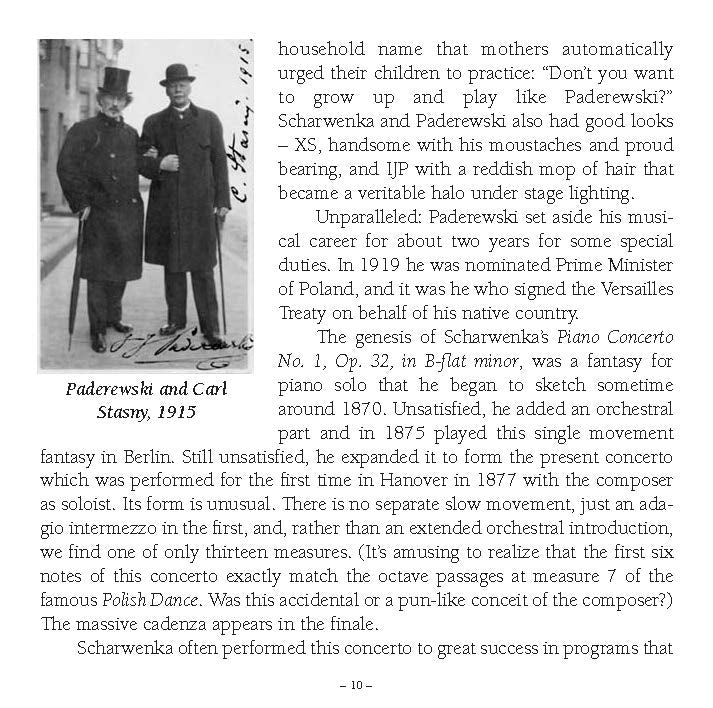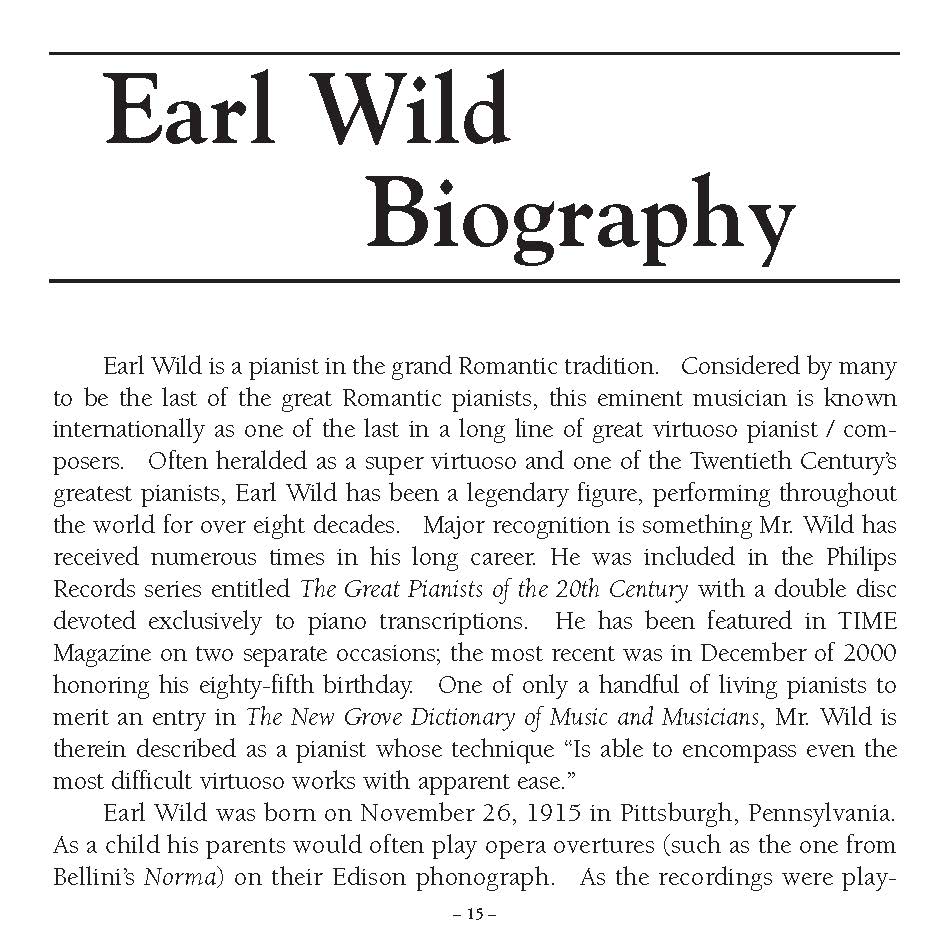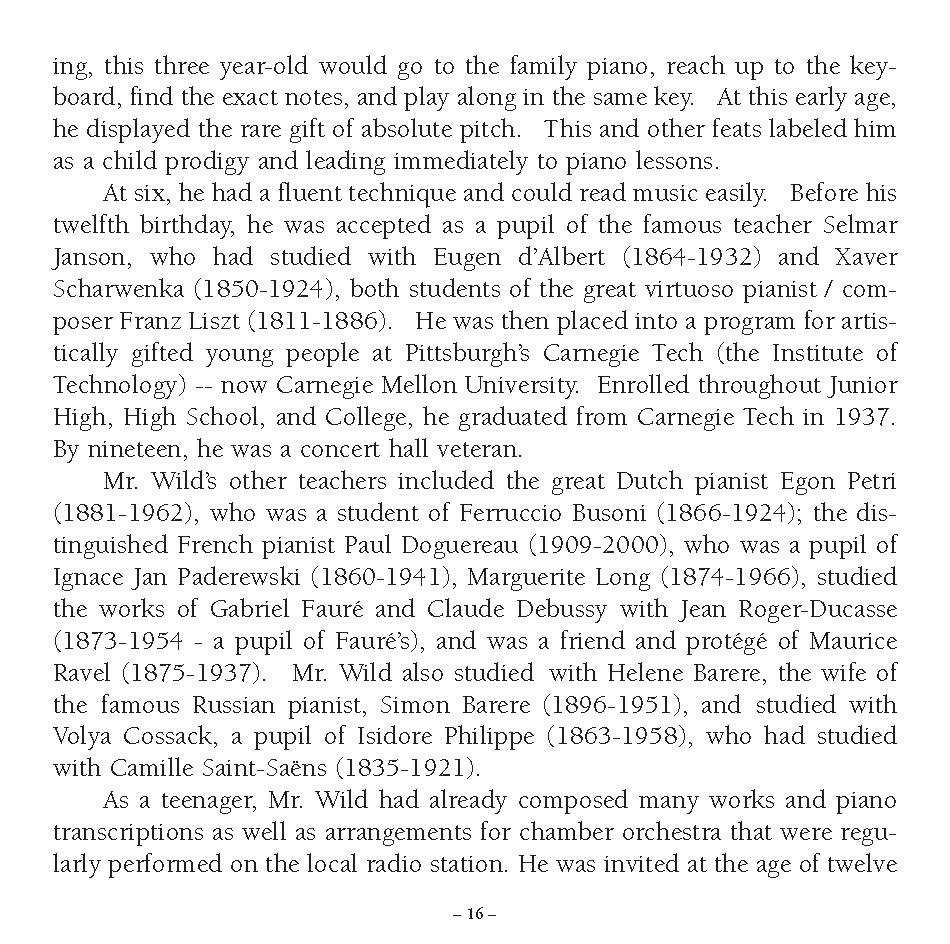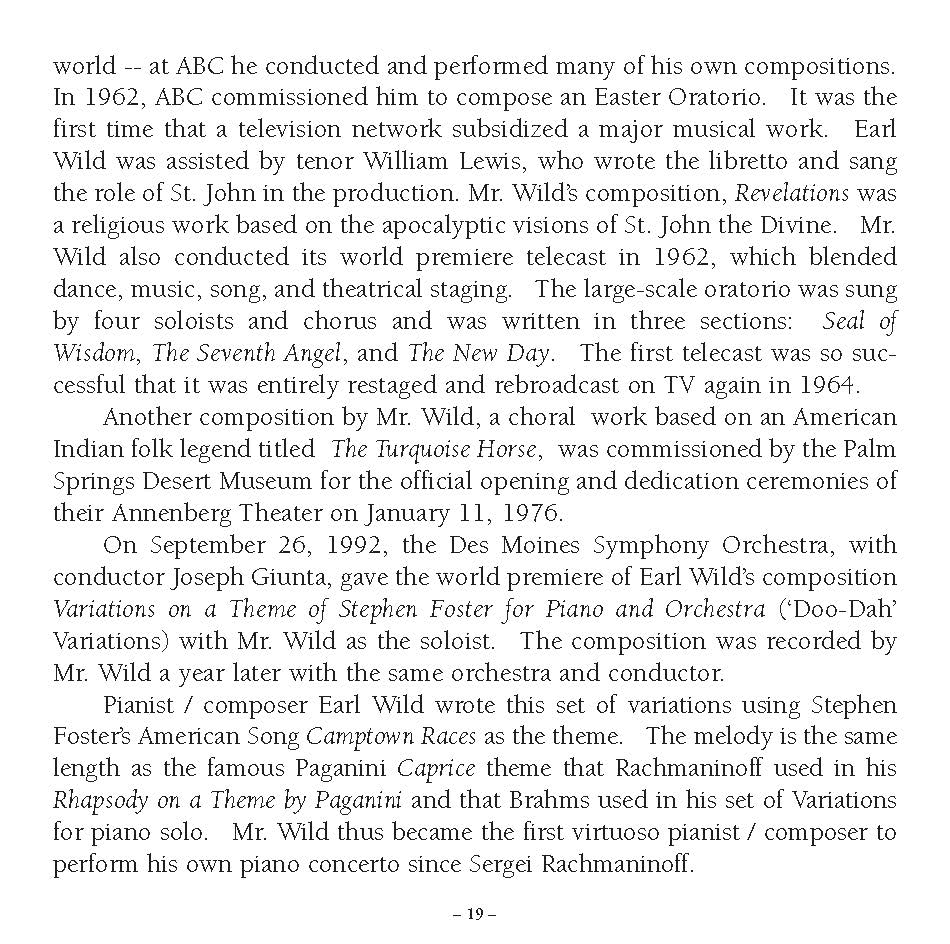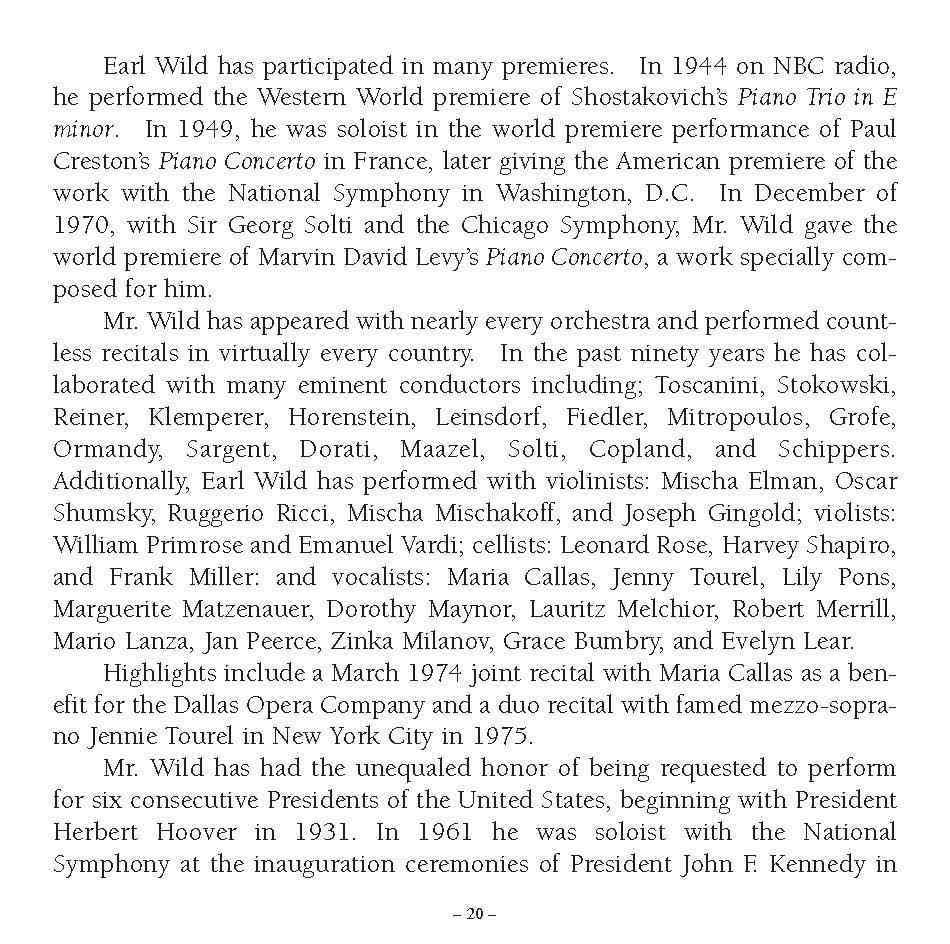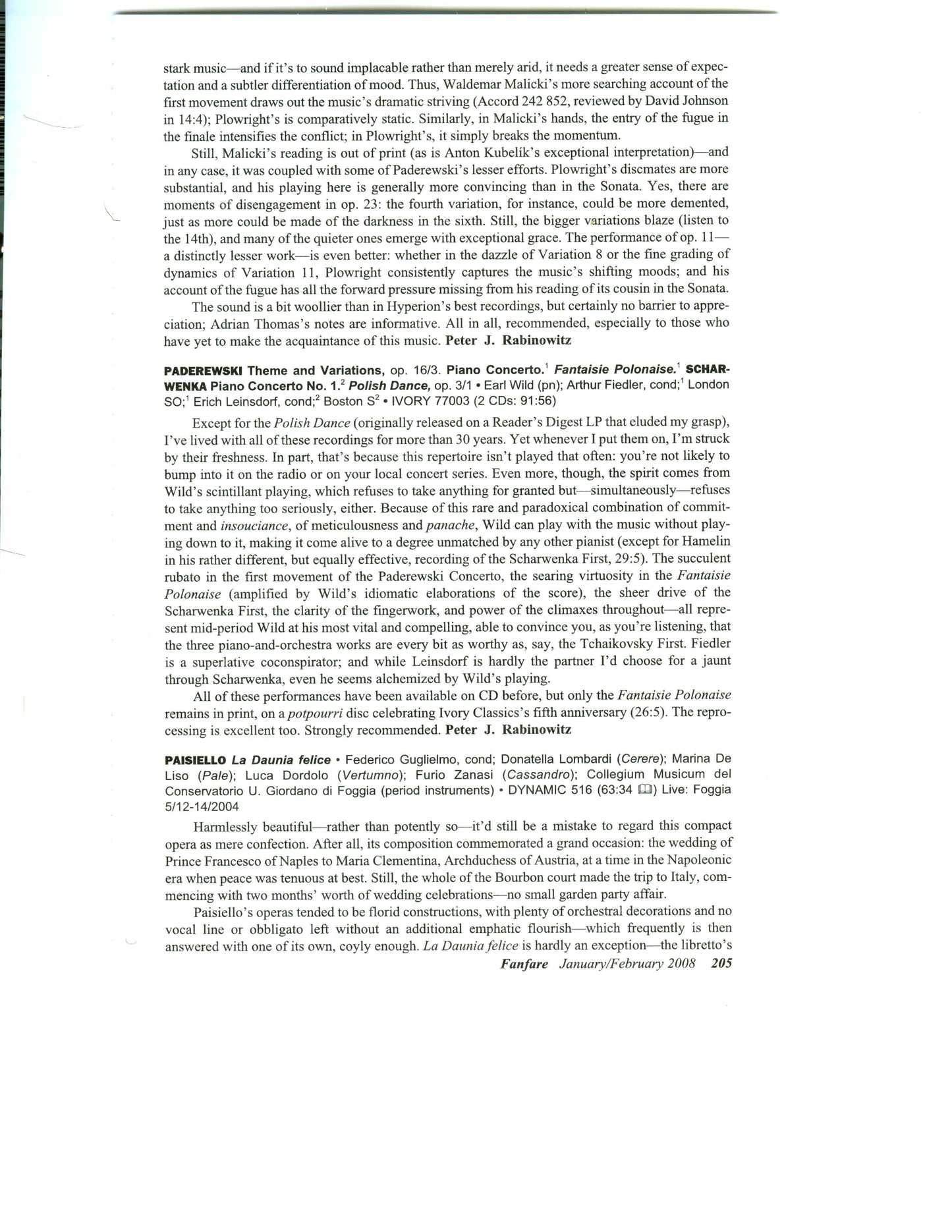1
/
of
31
Ivory Classics Music
Earl Wild: Paderewski & Scharwenka Piano Concertos
Earl Wild: Paderewski & Scharwenka Piano Concertos
Regular price
$15.00 USD
Regular price
Sale price
$15.00 USD
Unit price
/
per
Couldn't load pickup availability
Earl Wild: Paderewski / Scharwenka
Ignacy Jan Paderewski (1860-1941)
1-02. - 1-05.
Recorded September 6, 1970, Barking Town Hall, London, England
Recording Engineer: Robert Auger
Steinway Piano
2-01. - 2-03.
Recorded January 20, 1969, Symphony Hall, Boston, MA
Producer: Peter Delheim
Engineer: Bernard Keville
Baldwin Piano
Remastering Producer: Michael Rolland Davis
Remastering Engineer: Ed Thompson
Earl Wild's famous groundbreaking 1970 recording of the Paderewski Concerto Op. 17 with Arthur Fiedler and the LSO is being re-released in a High-Resolution remastering by Ivory Classics. The double CD also includes a spectacular performance of Paderewski's lively Fantaisie Polonaise for piano and orchestra Op. 19 and his Theme and Variations Op. 16, No. 3 for solo piano On disc two is the equally famous 1969 recording of the Scharwenka Concerto No. 1 Op. 32 with Erich Leinsdorf and the Boston Symphony along with the Polish Dance Op. 3, No. 1 for solo piano. (ADD)
Disc.Reviews
Thanks to beautifully balanced High-Resolution remasterings of recordings originally made in 1969/70, pianist Earl Wild is heard once again in absolutely stunning performances of showpieces by two Polish composers who have been all but forgotten, Ignacy Jan Paderewski (1860-1941) and Franz Xaver Scharwenka (1850-1924). Both in terms of the music and its realization by Wild and the forces heard with him, this is the excitement of the sort you aren't likely to hear often in today's concert halls.
Once, Paderewski's Piano Concerto in A Minor, Op. 17 used to have a secure place in the standard concerto repertoire. What happened? Most likely, Paderewski's ardent nationalism and his heart-on-sleeve emotionalism (and occasional sentimentality) were simply out of tune with the post-war world. What we have lost is shown clearly in this over-the-top performance by Earl wild with robust support by the London Symphony Orchestra under Arthur Fiedler. The writing in the purely orchestral passages is bold, explosive, and propulsive, rather more than was expected in a late 19th century virtuoso concerto. That clarifies the role of the soloist and makes his contribution seem all the more stunning when we hear him, either in the spotlight or playing in vigorous opposition to the orchestra by doubling it in the tutti passages. The brilliant arpeggio passages, typically played by the pianist an octave above the initial statement upon repetition, call for special commendation in this recording.
Paderewski's solo Theme and Variations, Op. 16, No. 3 and his Fantaisie Polonaise in G Minor, Op. 19 in which Wild is again joined by Fiedler and the LSO (the last-named conspicuous for the sheer velocity of the soloist part) fill out Disc 1 very nicely.
On Disc 2 of this specially priced 2-CD slimline, Wild joins forces with Erich Leinsdort and the Boston Symphony Orchestra in Scharwenka's Piano Concerto No. 1 in B-flat Minor, Op 32. The work is hardly less brilliant than the Paderewski, and in some ways is even more stunning. For one thing, it has no slow movement, only fast and faster ones, marked Allegro patetico, Scherzo: Allegro assai, and Allegro non tanto. Wild maintains a light, flexible touch in a work that combines sentiment with Virtuosity spelled with a capital V. In contrast to the Paderewski Concerto, the Scharwenka calls for the pianist to be playing almost continually throughout its 28 minute length, a feat in itself. Brilliant, exhibitionistic, and (inevitably) reminiscent of other, greater composers throughout the romantic era, it is worth hearing as a zestful relic of a bygone age.
New Classik Reviews, May. 2008
Back into the ring come Earl Wild's immensely characterful, brilliantly executed recordings of two near contemporaneous concertos by Paderewski and Scharwenka. Both these composers' concertos have been recorded by Hyperion but Wild's performances lose nothing in comparison with Hamelin and Piers Lane, despite the fact that they were taped in 1969 (Scharwenka) and 1970 (Paderewski). Nor against other Paderewski alternatives; Fialkowska on Naxos, Blumental on Brana and Hobson on Zephyr.
Wild was a shoe-in for the Paderewski in particular. Teamed with Arthur Fiedler and the LSO he relishes the post-Lisztian drama of the writing as much as Fiedler carves out the subtle Rimsky flecked orchestration. You couldn't have asked for two more appropriate combatants; Wild for his Lisztian bravura and gorgeous legato, and Fiedler for his command of the work's persuasive rhetoric. He, after all, had recorded the work once before, with Jesus Maria Sanromá, in the presence of the composer in 1939. It's true that some of the orchestral tuttis have been slightly “reinforced” in this Wild recording but one can't really cavil, so powerful and cogent is the conducting. And Wild himself has filled out the cadenzas a little, though again without in any warm harming the fabric of the music. These are small points, though editors may tut.
The refined and tonally expressive qualities brought to bear are at their height in the slow movement – beautifully balanced chording and superfine legato from Wild; and marvelous tonal bloom from the LSO in the Romanza whilst the grand theme of the finale is announced with panache and indelibly exciting rhythmic control. Wild pours out calorie filled chordal waves as the music becomes impassioned, And it's worth it as this is a successful, finely constructed, tuneful, virtuosic and thoroughly engaging work that should be heard in concert not simply on disc. Coupled on the Paderewski disc is the Theme and Variations for solo piano, which the booklet omits to note is a play on the Harmonious Blacksmith. It's full of glint, nobility, charm, romantic tracery and leonine power. Then there's the Fantasie Polonaise in G minor where Wild is once again joined by Fiedler and the LSO. Wild has extended the arpeggio figures into higher octaves – he has a bit of a fetish about changing keys as admirers will know – and the performance as a whole is full of joie de vivre, and rare expression too. It's not on the same level of consistent creativity as the Concerto but it's worth a spin now and again.
If Paderewski's Concerto inclines to post-Lisztian principles Scharwenka's First is more post-Schumann in orientation. But there's a pot of unceasing bravura and a powerful march theme from about 7:00 that sets the pulse racing. The delightful if non-stop scherzo has its finger busting, wrist-compacting moments, squarely dealt with by Wild, and the panache and bravura of the finale almost convinces one that it's not too long. In truth it is too long but one of the merits of a great performance, which this is, is suspending one's critical judgement. There's a delightful Polish Dance as an encore.
The concertos have both been on CD on the Élan label – an appropriate name for so vital a brace of performances. This however is the first time that they – concertos and other items - have been collated in this way. The second disc may be short measure as a result but the performances have such verve and immediacy that Wild's admirers and lovers of the Romantic piano concerto will find it hard to resist.
Jonathan Woolf, Music Web.com, Mar. 2008
The concerto is a period piece – a bravura work in late 19th-century rhetoric...one can have fun tracing the various composers who play a part in this work. Greig is there, and Tchaikovsky, Liszt and Schumann, and Chopin, Anton Rubinstein, and Saint- Saëns. Toward the end of the last movement, there is a theme that prefigures Rachmaninoff and the “Warsaw” Concerto, which is something of a feat considering that Scharwenka’s was composed in 1877...It is a wing-ding of a romp, one in which the pianist starts with a great splurge and scarcely removes his hands from the keys for the next half hour. It has pretty melodies, and it has a fiendishly difficult solo part...Period composers do reflect their age, and Scharwenka did, completely. It was a comfortable age, an age when the virtuoso was king, an age where sentiment ruled...And so the Scharwenka B flat minor Concerto was a charming, lightweight, and exhibitionistic work....the way Mr. Wild played it was actually startling. It was sheer control all the way through with a feathery touch, minimum pedal, and absolute clear articulation....Mr. Wild played it like a romantic hero of the keyboard, and he had a fine accompaniment from Mr. Leinsdorf.
Harold C. Schonberg, The New York Times, Dec. 1968
Earl Wild plays...with the flash and glitter and the sense of indomitable panache that would surely have pleased the composer, and he is exuberantly accompanied by Fiedler and the LSO.
Gramophone
Paderewski-Scharwenka CD-77003
Diapason - France
Ignacy Jan Paderewski (1860-1941)
1-02. - 1-05.
Recorded September 6, 1970, Barking Town Hall, London, England
Recording Engineer: Robert Auger
Steinway Piano
2-01. - 2-03.
Recorded January 20, 1969, Symphony Hall, Boston, MA
Producer: Peter Delheim
Engineer: Bernard Keville
Baldwin Piano
Remastering Producer: Michael Rolland Davis
Remastering Engineer: Ed Thompson
Earl Wild's famous groundbreaking 1970 recording of the Paderewski Concerto Op. 17 with Arthur Fiedler and the LSO is being re-released in a High-Resolution remastering by Ivory Classics. The double CD also includes a spectacular performance of Paderewski's lively Fantaisie Polonaise for piano and orchestra Op. 19 and his Theme and Variations Op. 16, No. 3 for solo piano On disc two is the equally famous 1969 recording of the Scharwenka Concerto No. 1 Op. 32 with Erich Leinsdorf and the Boston Symphony along with the Polish Dance Op. 3, No. 1 for solo piano. (ADD)
Disc.Reviews
Thanks to beautifully balanced High-Resolution remasterings of recordings originally made in 1969/70, pianist Earl Wild is heard once again in absolutely stunning performances of showpieces by two Polish composers who have been all but forgotten, Ignacy Jan Paderewski (1860-1941) and Franz Xaver Scharwenka (1850-1924). Both in terms of the music and its realization by Wild and the forces heard with him, this is the excitement of the sort you aren't likely to hear often in today's concert halls.
Once, Paderewski's Piano Concerto in A Minor, Op. 17 used to have a secure place in the standard concerto repertoire. What happened? Most likely, Paderewski's ardent nationalism and his heart-on-sleeve emotionalism (and occasional sentimentality) were simply out of tune with the post-war world. What we have lost is shown clearly in this over-the-top performance by Earl wild with robust support by the London Symphony Orchestra under Arthur Fiedler. The writing in the purely orchestral passages is bold, explosive, and propulsive, rather more than was expected in a late 19th century virtuoso concerto. That clarifies the role of the soloist and makes his contribution seem all the more stunning when we hear him, either in the spotlight or playing in vigorous opposition to the orchestra by doubling it in the tutti passages. The brilliant arpeggio passages, typically played by the pianist an octave above the initial statement upon repetition, call for special commendation in this recording.
Paderewski's solo Theme and Variations, Op. 16, No. 3 and his Fantaisie Polonaise in G Minor, Op. 19 in which Wild is again joined by Fiedler and the LSO (the last-named conspicuous for the sheer velocity of the soloist part) fill out Disc 1 very nicely.
On Disc 2 of this specially priced 2-CD slimline, Wild joins forces with Erich Leinsdort and the Boston Symphony Orchestra in Scharwenka's Piano Concerto No. 1 in B-flat Minor, Op 32. The work is hardly less brilliant than the Paderewski, and in some ways is even more stunning. For one thing, it has no slow movement, only fast and faster ones, marked Allegro patetico, Scherzo: Allegro assai, and Allegro non tanto. Wild maintains a light, flexible touch in a work that combines sentiment with Virtuosity spelled with a capital V. In contrast to the Paderewski Concerto, the Scharwenka calls for the pianist to be playing almost continually throughout its 28 minute length, a feat in itself. Brilliant, exhibitionistic, and (inevitably) reminiscent of other, greater composers throughout the romantic era, it is worth hearing as a zestful relic of a bygone age.
New Classik Reviews, May. 2008
Back into the ring come Earl Wild's immensely characterful, brilliantly executed recordings of two near contemporaneous concertos by Paderewski and Scharwenka. Both these composers' concertos have been recorded by Hyperion but Wild's performances lose nothing in comparison with Hamelin and Piers Lane, despite the fact that they were taped in 1969 (Scharwenka) and 1970 (Paderewski). Nor against other Paderewski alternatives; Fialkowska on Naxos, Blumental on Brana and Hobson on Zephyr.
Wild was a shoe-in for the Paderewski in particular. Teamed with Arthur Fiedler and the LSO he relishes the post-Lisztian drama of the writing as much as Fiedler carves out the subtle Rimsky flecked orchestration. You couldn't have asked for two more appropriate combatants; Wild for his Lisztian bravura and gorgeous legato, and Fiedler for his command of the work's persuasive rhetoric. He, after all, had recorded the work once before, with Jesus Maria Sanromá, in the presence of the composer in 1939. It's true that some of the orchestral tuttis have been slightly “reinforced” in this Wild recording but one can't really cavil, so powerful and cogent is the conducting. And Wild himself has filled out the cadenzas a little, though again without in any warm harming the fabric of the music. These are small points, though editors may tut.
The refined and tonally expressive qualities brought to bear are at their height in the slow movement – beautifully balanced chording and superfine legato from Wild; and marvelous tonal bloom from the LSO in the Romanza whilst the grand theme of the finale is announced with panache and indelibly exciting rhythmic control. Wild pours out calorie filled chordal waves as the music becomes impassioned, And it's worth it as this is a successful, finely constructed, tuneful, virtuosic and thoroughly engaging work that should be heard in concert not simply on disc. Coupled on the Paderewski disc is the Theme and Variations for solo piano, which the booklet omits to note is a play on the Harmonious Blacksmith. It's full of glint, nobility, charm, romantic tracery and leonine power. Then there's the Fantasie Polonaise in G minor where Wild is once again joined by Fiedler and the LSO. Wild has extended the arpeggio figures into higher octaves – he has a bit of a fetish about changing keys as admirers will know – and the performance as a whole is full of joie de vivre, and rare expression too. It's not on the same level of consistent creativity as the Concerto but it's worth a spin now and again.
If Paderewski's Concerto inclines to post-Lisztian principles Scharwenka's First is more post-Schumann in orientation. But there's a pot of unceasing bravura and a powerful march theme from about 7:00 that sets the pulse racing. The delightful if non-stop scherzo has its finger busting, wrist-compacting moments, squarely dealt with by Wild, and the panache and bravura of the finale almost convinces one that it's not too long. In truth it is too long but one of the merits of a great performance, which this is, is suspending one's critical judgement. There's a delightful Polish Dance as an encore.
The concertos have both been on CD on the Élan label – an appropriate name for so vital a brace of performances. This however is the first time that they – concertos and other items - have been collated in this way. The second disc may be short measure as a result but the performances have such verve and immediacy that Wild's admirers and lovers of the Romantic piano concerto will find it hard to resist.
Jonathan Woolf, Music Web.com, Mar. 2008
The concerto is a period piece – a bravura work in late 19th-century rhetoric...one can have fun tracing the various composers who play a part in this work. Greig is there, and Tchaikovsky, Liszt and Schumann, and Chopin, Anton Rubinstein, and Saint- Saëns. Toward the end of the last movement, there is a theme that prefigures Rachmaninoff and the “Warsaw” Concerto, which is something of a feat considering that Scharwenka’s was composed in 1877...It is a wing-ding of a romp, one in which the pianist starts with a great splurge and scarcely removes his hands from the keys for the next half hour. It has pretty melodies, and it has a fiendishly difficult solo part...Period composers do reflect their age, and Scharwenka did, completely. It was a comfortable age, an age when the virtuoso was king, an age where sentiment ruled...And so the Scharwenka B flat minor Concerto was a charming, lightweight, and exhibitionistic work....the way Mr. Wild played it was actually startling. It was sheer control all the way through with a feathery touch, minimum pedal, and absolute clear articulation....Mr. Wild played it like a romantic hero of the keyboard, and he had a fine accompaniment from Mr. Leinsdorf.
Harold C. Schonberg, The New York Times, Dec. 1968
Earl Wild plays...with the flash and glitter and the sense of indomitable panache that would surely have pleased the composer, and he is exuberantly accompanied by Fiedler and the LSO.
Gramophone
Paderewski-Scharwenka CD-77003
Diapason - France
Share

